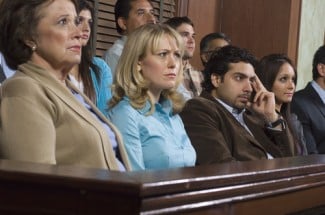Do you think jurors should be able to pose questions to lawyers and trial witnesses?

Image from Shutterstock.
Last week, the jury in a Boston corruption trial had a whopping 281 questions for lawyers and trial witnesses. Among other questions, jurors asked for a definition of “racketeering.”
The Boston Globe interviewed lawyers and law professors about their thoughts on the practice of allowing juror questions during trial. One defense lawyer said she thinks it’s a “dangerous step.”
“In order for you to generate those questions, you have to be an advocate for one side or the other, and that’s where the problem comes in,” Rosemary Scapicchio said. “You shouldn’t want a juror to be in a position to advocate for one side or the other before all of the evidence comes in.”
This week, we’d like to ask you: Should jurors be able to pose questions to lawyers and trial witnesses? Have you ever been a part of a trial where juror questions were allowed and had a positive or negative impact?
Answer in the comments.
Read the answers to last week’s question: What tactics do you use to improve your memory, and do they work?
Featured answer:
Posted by KBM: “In my practice, I use hierarchical and other graphics to embed information for later recall. Timelines; decision trees, org charts, Gantt charts, flowcharts and images of key documents/text. My brain works better recalling concept and factual detail stored as images rather than as just words. I suspect this is related, in no small part, to the act of creating those devices. Which is why I always have to go back to the store for whatever I forgot, when I make a shopping list. It’s just words.”
Do you have an idea for a future question of the week? If so, contact us.



